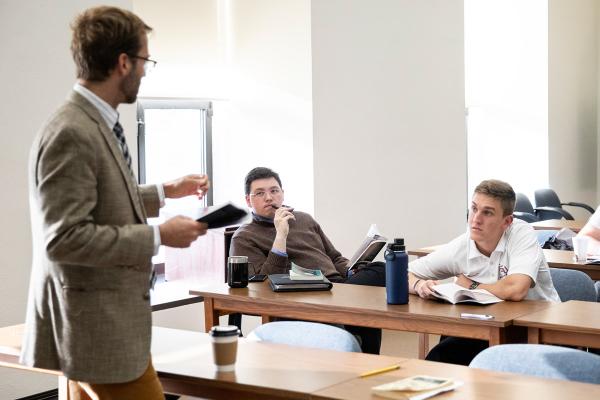
Seminary formation across the world is expanding with the introduction of a preparatory year at the beginning of their studies.
Vocations director Father Jeff Hebert said he is excited to officially offer a "propaedeutic year" (pronounced pro-pah-DUE-tic) this fall to eight new seminarians. The stage was called for by the Vatican’s Congregation for the Clergy in 2016 to focus on discernment and foster healthier seminarians who will become priests.
“You are focused on all the foundation you need to enter seminary formation but also into your discernment,” Hebert said. “The hope is that adding this extra year of focused discernment on human and spiritual formation, there will be fewer guys leaving the seminary. Most of the discernment will be on the front end. Not that they can’t discern out, but it would sooner rather than later.”
The U.S. Conference of Catholic Bishops’ Program of Priestly Formation, Sixth Edition, was promulgated last year and included the requirement for a preparatory stage.
In the past, training for seminarians with a college degree was six years, but beginning this fall, it will be seven years. Seminarians entering after high school or with no college degree will study for nine years, instead of eight, before being ordained.
Father Hebert said seminarian formation focuses heavily on intellectual formation, but there are three other components to training a priest that can be sidelined when class loads are heavy. The undergraduate program now will be five years, allowing seminarians to take fewer classes each semester and have more time for spiritual, human and pastoral formation.
“The intellectual side of things in the seminary is totally disproportionate, in my opinion,” he said. “You are taking a lot of classes; you are studying most of the time. There are three other dimensions to seminary formation that you have to squeeze into the remaining hours of the day.”
Seminarian Steven Wilson, a member of Holy Rosary Church in Stuttgart, is the first Arkansas seminarian to take the program through St. Meinrad Seminary in Indiana. When he entered the seminary last fall, he started with the "propaedeutic" program, which means "to teach beforehand," with six seminarians from other dioceses.
Wilson, a former high school English teacher, said his formation over the past year included attending Masses with Black, Hispanic and Filipino communities, days of recollection and retreats. A major project was reading about diocesan history and writing a paper on the state of the diocese now by interviewing diocesan directors.
“That was my favorite part of the program,” Wilson said. “There was so much interesting history that I didn’t expect for Arkansas. So much interesting history to uncover.”
Wilson admitted he wasn’t enthusiastic about adding a year to his formation, but he is glad he completed the preparatory year.
“As the year has gone on, from what I can tell, anyone who had reservations about it has been really surprised by how beneficial it has been,” he said. “I didn’t really want to do it, but I could tell how beneficial it would be down the line. Now I am actually sad that it is ending.”
In the fall, three Arkansas seminarians will enter that same program at St. Meinrad. The other five new seminarians will live at the House of Formation in Little Rock. They will take 12 hours of college credit: nine hours at the University of Arkansas-Little Rock and one three-hour class through Newman University in Wichita, Kan., online. Three times a week they will attend “conferences” with Father Hebert, who will teach all propaedeutic courses for at least the first year.
The final year of seminary formation will also change with the addition of a “vocational synthesis stage,” Hebert said. This phase will be introduced in the diocese in 2024.
“‘They are requiring guys once they are ordained a deacon to spend at least six months in a parish. The bishops of the United States have decided that can happen after three and a half years of theological studies. So that December of their fourth year, they would be ordained at that point. And then they’d go straight to the parish after the diaconate ordination, and they are done with seminary. They would live in the parish for six months and at the end of that period, they get ordained a priest.”
The Diocese of Little Rock analyzes its seminarian recruitment to forecast how many diocesan seminarians it will have over the next decade or two. Father Hebert said with 30 seminarians, it is expected about 37 percent will discern other vocations. If the diocese ordains two seminarians a year, it will maintain its current priest count. If the diocese ordains three or more seminarians a year, the presbyterate will increase in the state.
“Not only are we replacing the guys who are retiring, but we’re adding,” he said.
Please read our Comments Policy before posting.
Article comments powered by Disqus Centennial Mass highlights first Black seminary
Centennial Mass highlights first Black seminary
 Diocese welcomes larger seminarian class
Diocese welcomes larger seminarian class
 Catholic seminarians accompany patients at hospital
Catholic seminarians accompany patients at hospital
 'Cabrini' film tells story of saint with great faith
'Cabrini' film tells story of saint with great faith
 Bishop Taylor announces more pastoral appointments
Bishop Taylor announces more pastoral appointments
 Most U.S. Catholics approve of Pope Francis, Pew says
Most U.S. Catholics approve of Pope Francis, Pew says
 Winning directory photo honors Our Lady of Guadalupe
Winning directory photo honors Our Lady of Guadalupe
 St. Joseph a model of solidarity with immigrants
St. Joseph a model of solidarity with immigrants
 Two gifts after Jesus’ death: Virgin Mary and Eucharist
Two gifts after Jesus’ death: Virgin Mary and Eucharist
 Why we have an altar, and not just a communion table
Why we have an altar, and not just a communion table
 Pope: Wars should be resolved through nonviolence
Pope: Wars should be resolved through nonviolence
 Living relationship with Jesus Christ in the Eucharist
Living relationship with Jesus Christ in the Eucharist